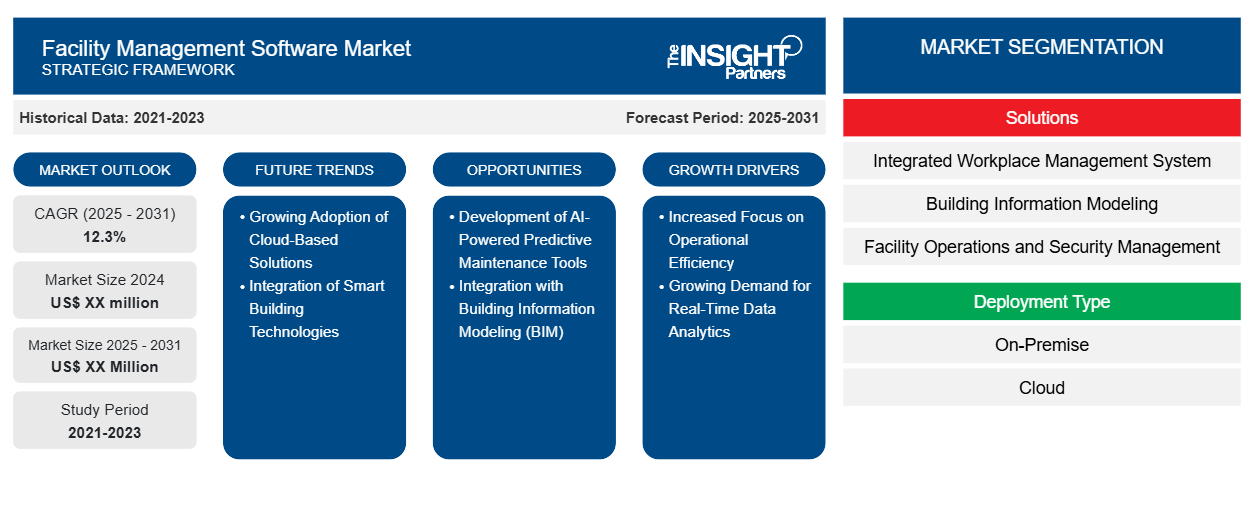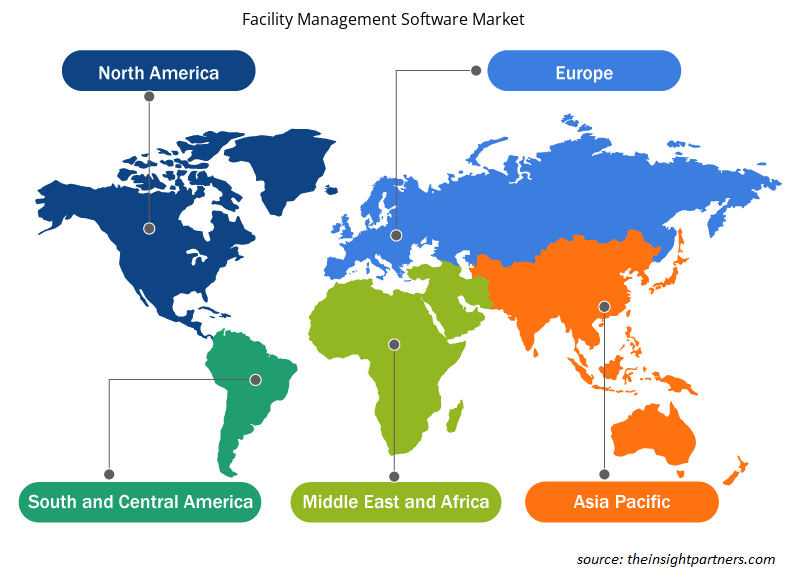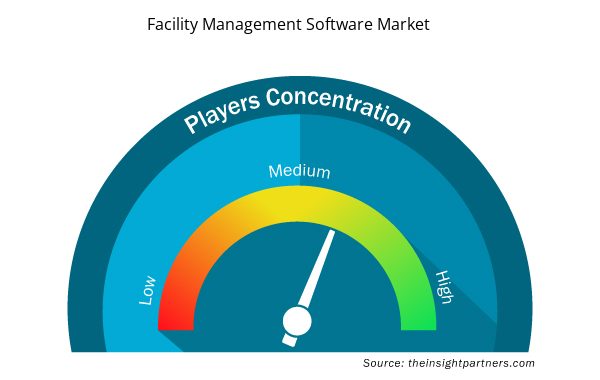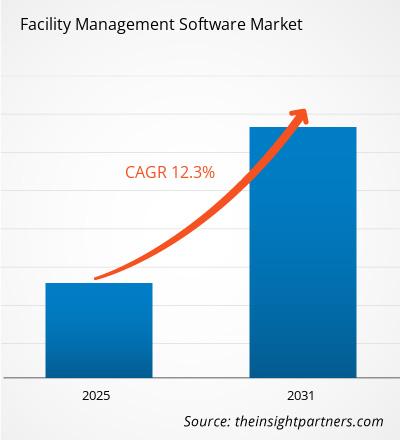The Facility Management Software Market is expected to register a CAGR of 12.3% from 2025 to 2031, with a market size expanding from US$ XX million in 2024 to US$ XX Million by 2031.
The report is segmented By Solutions (Integrated Workplace Management System, Building Information Modeling, Facility Operations and Security Management, Facility Environment Management, Lease Accounting and Real Estate Management, Others), Deployment Type (On-Premise, Cloud), End-User (BFSI, IT and Telecom, Transport and Logistics, Manufacturing, Retail, Pharmaceuticals, Others). The global analysis is further broken-down at regional level and major countries. The report offers the value in USD for the above analysis and segments
Purpose of the Report
The report Facility Management Software Market by The Insight Partners aims to describe the present landscape and future growth, top driving factors, challenges, and opportunities. This will provide insights to various business stakeholders, such as:
- Technology Providers/Manufacturers: To understand the evolving market dynamics and know the potential growth opportunities, enabling them to make informed strategic decisions.
- Investors: To conduct a comprehensive trend analysis regarding the market growth rate, market financial projections, and opportunities that exist across the value chain.
- Regulatory bodies: To regulate policies and police activities in the market with the aim of minimizing abuse, preserving investor trust and confidence, and upholding the integrity and stability of the market.
Facility Management Software Market Segmentation
Solutions
- Integrated Workplace Management System
- Building Information Modeling
- Facility Operations and Security Management
- Facility Environment Management
- Lease Accounting and Real Estate Management
- Others
Deployment Type
- On-Premise
- Cloud
End-User
- BFSI
- IT and Telecom
- Transport and Logistics
- Manufacturing
- Retail
- Pharmaceuticals
- Others
Geography
- North America
- Europe
- Asia-Pacific
- South and Central America
- Middle East and Africa
Customize This Report To Suit Your Requirement
You will get customization on any report - free of charge - including parts of this report, or country-level analysis, Excel Data pack, as well as avail great offers and discounts for start-ups & universities
Facility Management Software Market: Strategic Insights

- Get Top Key Market Trends of this report.This FREE sample will include data analysis, ranging from market trends to estimates and forecasts.
Facility Management Software Market Growth Drivers
- Increased Focus on Operational Efficiency: Facility management software is increasingly being adopted as organizations strive to enhance operational efficiency. By automating routine tasks such as maintenance scheduling, space management, and resource allocation, businesses can significantly reduce downtime and operational costs. This shift not only streamlines workflows but also allows facility managers to allocate resources more effectively, ultimately leading to improved productivity and service delivery within the organization.
- Growing Demand for Real-Time Data Analytics: The need for real-time data analytics in facility management is driving the adoption of facility software solutions. Organizations are recognizing the value of data-driven decision-making, allowing them to monitor facility performance, identify trends, and optimize resource usage. This demand for insights into building operations encourages the integration of IoT devices and sensors, enabling facility managers to analyze metrics such as energy consumption, occupancy levels, and maintenance needs in real-time, thereby enhancing overall operational effectiveness.
Facility Management Software Market Future Trends
- Growing Adoption of Cloud-Based Solutions: The trend towards cloud-based facility management software is gaining momentum as organizations seek flexibility, scalability, and cost-effectiveness. Cloud solutions facilitate remote access to facility data and management tools, allowing teams to collaborate more efficiently regardless of location. This shift also reduces the need for on-premises infrastructure, making it easier for organizations to integrate new features and updates, ensuring they remain competitive in a rapidly evolving market.
- Integration of Smart Building Technologies: The integration of smart building technologies into facility management software is becoming increasingly prevalent. By leveraging IoT devices, AI, and machine learning, organizations can automate various building operations, such as lighting, HVAC, and security systems. This trend not only enhances energy efficiency and occupant comfort but also allows facility managers to optimize operational performance through predictive maintenance and improved resource allocation strategies.
Facility Management Software Market Opportunities
- Development of AI-Powered Predictive Maintenance Tools: The growing focus on predictive maintenance presents an opportunity for facility software developers to create AI-powered tools that anticipate equipment failures before they occur. By analyzing historical data and identifying patterns, these tools can help facility managers schedule maintenance proactively, reducing downtime and repair costs. This capability not only enhances asset longevity but also contributes to more efficient facility operations, making it a valuable addition to facility management software offerings.
- Integration with Building Information Modeling (BIM): The integration of facility management software with Building Information Modeling (BIM) systems offers significant opportunities for enhancing building lifecycle management. By combining detailed building data with facility management processes, organizations can improve collaboration among stakeholders, streamline facility operations, and enhance decision-making throughout a building's lifecycle. This synergy can lead to better maintenance outcomes, reduced operational costs, and increased asset value, making it an attractive proposition for facility management software providers.
Facility Management Software Market Regional Insights
The regional trends and factors influencing the Facility Management Software Market throughout the forecast period have been thoroughly explained by the analysts at Insight Partners. This section also discusses Facility Management Software Market segments and geography across North America, Europe, Asia Pacific, Middle East and Africa, and South and Central America.

- Get the Regional Specific Data for Facility Management Software Market
Facility Management Software Market Report Scope
| Report Attribute | Details |
|---|---|
| Market size in 2024 | US$ XX million |
| Market Size by 2031 | US$ XX Million |
| Global CAGR (2025 - 2031) | 12.3% |
| Historical Data | 2021-2023 |
| Forecast period | 2025-2031 |
| Segments Covered |
By Solutions
|
| Regions and Countries Covered | North America
|
| Market leaders and key company profiles |
Facility Management Software Market Players Density: Understanding Its Impact on Business Dynamics
The Facility Management Software Market market is growing rapidly, driven by increasing end-user demand due to factors such as evolving consumer preferences, technological advancements, and greater awareness of the product's benefits. As demand rises, businesses are expanding their offerings, innovating to meet consumer needs, and capitalizing on emerging trends, which further fuels market growth.
Market players density refers to the distribution of firms or companies operating within a particular market or industry. It indicates how many competitors (market players) are present in a given market space relative to its size or total market value.
Major Companies operating in the Facility Management Software Market are:
- Accruent
- ARCHIBUS, INC
- FM:Systems
- Hippo CMMS
- IBM Corporation
Disclaimer: The companies listed above are not ranked in any particular order.

- Get the Facility Management Software Market top key players overview
Key Selling Points
- Comprehensive Coverage: The report comprehensively covers the analysis of products, services, types, and end users of the Facility Management Software Market, providing a holistic landscape.
- Expert Analysis: The report is compiled based on the in-depth understanding of industry experts and analysts.
- Up-to-date Information: The report assures business relevance due to its coverage of recent information and data trends.
- Customization Options: This report can be customized to cater to specific client requirements and suit the business strategies aptly.
The research report on the Facility Management Software Market can, therefore, help spearhead the trail of decoding and understanding the industry scenario and growth prospects. Although there can be a few valid concerns, the overall benefits of this report tend to outweigh the disadvantages.
- Historical Analysis (2 Years), Base Year, Forecast (7 Years) with CAGR
- PEST and SWOT Analysis
- Market Size Value / Volume - Global, Regional, Country
- Industry and Competitive Landscape
- Excel Dataset



Report Coverage
Revenue forecast, Company Analysis, Industry landscape, Growth factors, and Trends

Segment Covered
This text is related
to segments covered.

Regional Scope
North America, Europe, Asia Pacific, Middle East & Africa, South & Central America

Country Scope
This text is related
to country scope.
Frequently Asked Questions
The report can be delivered in PDF/PPT format; we can also share excel dataset based on the request
The Facility Management Software Market is estimated to witness a CAGR of 12.3% from 2023 to 2031
Increasing complexity of facility operations and digital transformation and remote work trends are the majors factor driving the facility management software market
Rise of artificial intelligence and predictive analytics to play a significant role in the global facility management software market in the coming years
Trends and growth analysis reports related to Technology, Media and Telecommunications : READ MORE..
The List of Companies
1. Accruent
2. ARCHIBUS, INC
3. FM:Systems
4. Hippo CMMS
5. IBM Corporation
6. Nuvolo
7. Oracle
8. Planon
9. SAP
10. Trimble Inc.

 Get Free Sample For
Get Free Sample For